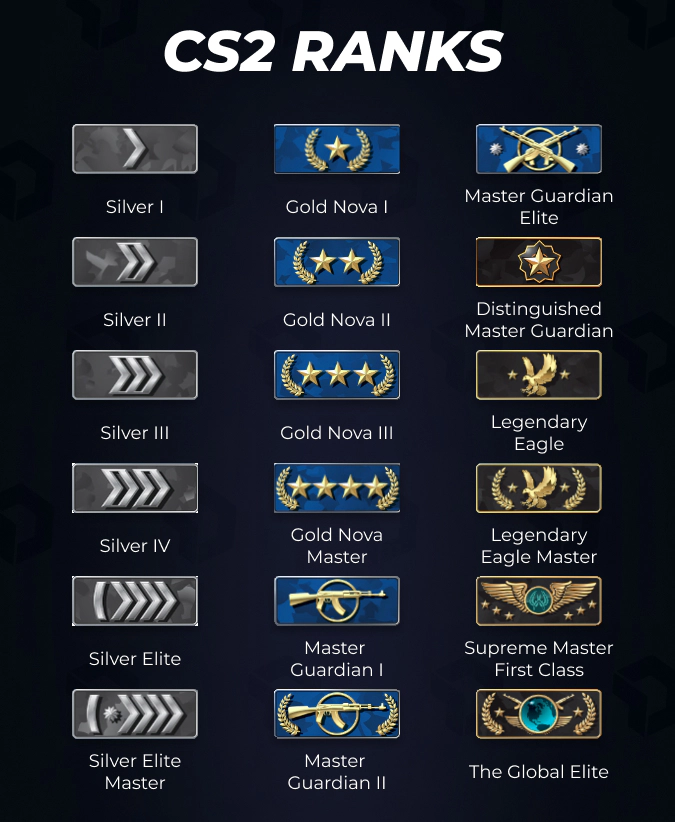Bodrum Escapes: Your Guide to Luxury and Leisure
Explore the best of Bodrum with exclusive insights and tips for an unforgettable experience.
Beyond the Rank: What CS2 Skill Groups Reveal About Players
Discover hidden insights in CS2 skill groups! Unveil what player rankings really reveal and boost your game strategy now!
Understanding the Hierarchy: What Each CS2 Skill Group Truly Represents
Understanding the hierarchy of skill groups in CS2 is crucial for players aiming to enhance their gameplay and rank up. The skill groups serve as a classification system that assesses a player's performance and skill level. In Counter-Strike 2 (CS2), players are categorized into various skill groups, ranging from Silver to Global Elite. These classifications are based on numerous factors, including match outcomes, personal performance statistics, and the skill levels of opposing players. As such, each group not only defines the competitive landscape but also sets expectations for teamwork and individual gameplay.
Each skill group in CS2 encapsulates distinct attributes that define a player’s capabilities. For example, Silver groups are typically filled with players who are still learning the fundamentals, while Gold represents a higher understanding of game mechanics and strategies. The Platinum and Diamond groups signify players who have mastered advanced tactics and consistently demonstrate high-level play. Finally, the Global Elite group showcases the top tier, where players exhibit exceptional skills, situational awareness, and teamwork. Recognizing these differences is essential for players looking to improve and ascend the CS2 skill hierarchy.

Counter-Strike is a popular tactical first-person shooter game that emphasizes teamwork and strategy. Players can customize their experience by adjusting various device settings to enhance performance and control. With its competitive nature and vibrant esports scene, Counter-Strike continues to attract millions of players worldwide.
The Psychology of Skill Groups: How They Influence Player Behavior in CS2
The concept of skill groups in CS2 plays a vital role in shaping player behavior and experience. Skill groups act as a benchmark, categorizing players based on their abilities and performance in the game. This categorization not only helps players find opponents of similar skill levels but also impacts their motivation and engagement. For instance, players in higher skill groups might feel a sense of pride and accomplishment, leading them to invest more time in improving their skills, while those in lower tiers could experience frustration, potentially impacting their gameplay and enjoyment. Understanding this psychological aspect can help developers tailor game experiences that better align with player expectations and encourage positive interactions.
Moreover, the influence of skill groups extends beyond just personal performance; it shapes community dynamics as well. Players often form social bonds within their skill bracket, leading to the creation of teams and friendships based on shared experiences and competitive spirit. This social aspect can significantly enhance player retention and encourage a more supportive gaming environment. However, disparities between skill groups can also lead to toxicity and negative interactions, especially when players feel overwhelmed or underappreciated. Thus, fostering a positive atmosphere across all skill levels is essential for maintaining a healthy player community in CS2, ensuring that every player feels valued and motivated to continue playing.
Are Skill Groups the Best Indicator of Player Potential in CS2?
In the ever-evolving landscape of CS2, understanding player potential is crucial for both individual gamers and teams aiming for success. One prevailing question is whether skill groups serve as the best indicator of this potential. While skill groups provide a quantitative measure of a player's current ability, they may not fully capture the nuances of an individual's gaming prowess. Factors such as teamwork, communication, and adaptability often play a more significant role in determining a player's future growth and success in competitive environments.
Moreover, relying solely on skill groups can lead to an oversimplification of player abilities. For instance, a player may consistently perform well in their skill group yet lack essential characteristics like game sense or strategic thinking. As teams scout for talent, it is essential to assess players holistically. This includes analyzing their gameplay style, clutch potential, and history of improvement. Therefore, while skill groups are useful, they should not be the only metric considered when evaluating a player's true potential in CS2.